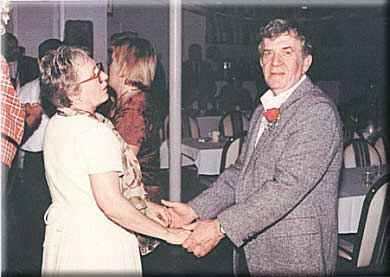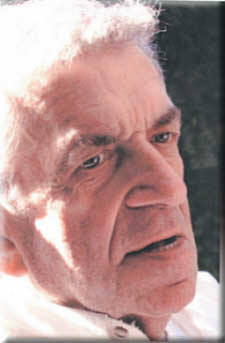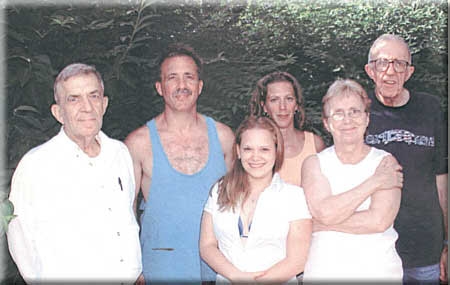The Next Battle
Richard Fournier is a self-made workaholic. Richard isn't happy if he isn't working. In their 44-year marriage, his wife Florida doesn't think he has sat down for more than five minutes. Richard's idea of fun is going over to a friend's business and helping him out on his days off. He worked on his vacation days because there was just nothing else he would rather do.
Richard's only hobby is cooking and baking. Richard bakes won-derful breads and was once begged to go into the bread making business with a partner in Florida. A definite no was the answer. He told his family that he just didn't want his cooking and baking to become "another job."
During his fifty years of working, Mr. Fournier has held a variety of jobs, including as a photo-finish camera operator at a grey-hound race track. When the dog track began using computer-operated equipment in 1996 for the photos at the finish line, Richard continued to work there first as an associate judge and later on a part-time basis.
In the late spring or early summer of 2002, Richard began to be unusually fatigued. At 68-years of age, one might think it was time for Richard to slow down a bit. But not Richard. A dedicated employee, he continued to perform his duties as an office assistant with the State of Connecticut. As a clerk with the Plainfield Greyhound Park, Mr. Fournier is responsible for recording the names, dates and results of urine specimens taken from the dogs participating in the races at the track.
In early December, he noticed that his navel was "starting to pop out." He consulted with his primary care physician who diagnosed a likely umbilical hernia. Same-day surgery was scheduled for December 19. During the surgery the doctor removed tissue measuring two by two by two and one-half centimeters and forwarded the same to the Pathology Department. Microscopic examination led to a working diagnosis of adenocarcinoma, with possible sources of the primary to be considered, including the pancreas, biliary tree, stomach and lung. The Pathology Department forwarded a paraffin block of the material to Impath in New York City for immunohistochemical analysis.

In a report dated December 24, 2002, Impath stated that the array of antibodies and tests ran favored a diagnosis of mesothelioma. During a follow-up consultation on December 27, Richard's doctor advised that tests upon the excised tissue were positive for malignancy, and referred Mr. Fournier to an oncologist in Norwich, Connecticut. The oncologist ordered CT scans of the head, chest and abdomen, as well as a bone scan. The CT scan of the head was negative for any metastatic lesions. The CT scan of the chest and abdomen revealed "bilateral pleural plaques with calcifications consistent with asbestos-related pleural disease", as well as ascites. (Such a finding is in fact consistent with heavy exposure to asbestos). A definite primary site could not be identified by the exam, although the pancreatic head was incompletely delineated. The bone scan revealed no evidence of metastatic disease.
Based upon the Impath report and the CT scans, the oncologist diagnosed Richard with malignant peritoneal mesothelioma. The oncologist believed that the mesothelioma was early stage and in the abdominal cavity and possibly originated in the chest. The tumor which had metastasized in the navel was on the right measuring approximately two by five inches. The oncologist told Mr. Fournier that this cancer is very rare, that only around 2500 Americans are diagnosed every year, and that Richard was his first patient with mesothelioma. Even though the grim statistics pointed to a survival period of only nine months, the oncologist arranged for Richard to enroll in a clinical trial utilizing Alimta plus Cisplatin.
Mr. Fournier began this chemotherapy on Monday, February 10, 2003. The process of intravenous administration of Alimta, Cisplatin, saline and other solutions takes five and one half hours. Medication administered during the process kept Mr. Fournier from suffering nausea or vomiting. But the fatigue was overwhelming for him. It really threw him for a loop. After each treatment, Richard would sleep constantly for two or three days on the couch. He literally had to "force" himself to get up and go to work. It became so difficult to work immediately after receiving chemotherapy that he rearranged his schedule or switched days with coworkers so that he would not miss any work. Richard has never officially missed a day of work because of his cancer or treatments.

After a few sessions of chemotherapy, the Cisplatin was removed from the cocktail because it seemed to be compromising his kidneys. Although Richard never complains of the pain to Florida, he admits that he has constant pain at level three on the right side. He also has suffered from loss of appetite, ascites, and night sweats.
The fluid continued to build up in his abdomen and created an uncomfortable pressure when he attempted to sit for any length of time. He was plagued with severe indigestion. Finally, on July 16, the fluid was drained from his abdomen. Approximately two quarts were removed, and to Richard it was like he was given a shot of adrenaline. He was able to sit upright longer and move around much easier. He wondered why his doctors had not done this earlier. He plans to ask them to drain the fluid again during his next visit. Richard feels that if more fluid is removed he may be able to go for an evening walk with Florida.
Right now, Richard is in limbo. He is not receiving chemotherapy. He has had blood tests run and is soon to be scheduled for a CT scan. Once the results come back, Richard and his doctor will sit down and talk about his future and treatment options.
Recently, family and friends celebrated his 70th birthday with a huge picnic which included some surprise visits from old friends. Florida just tries to make his life a little easier and a lot more pleasant. She has taken on the responsibility of the yard work and as she puts it, "leaves him alone" at the end of the day, so that he can get the rest he needs. For the first time in his life, Richard must sit still for more than five minutes. We are all pulling for him to recover, to regain his old life where he never ceased moving about. We will keep you posted on this indomitable Connecticut Yankee.
** POSTED SEPTEMBER 17, 2003 **
An Update -- 9/25/03
Richard recently completed three treatments of chemotherapy utilizing Taxol and Carboplatin. As Richard puts it, "The chemo knocked me flat on my ass." One of the potential side effects of the chemotherapy is neuropathy, and unfortunately both of Richard's feet feel cold and numb, so much so that he cannot walk. Yesterday he met with his oncologist Dr. Dhami, who discontinued the chemotherapy. Dr. Dhami said he "might have one more trick up his sleeve," and Richard hopes his oncologist can offer new treatment at their next consultation three weeks from now.
A couple of weeks ago, Richard had gotten his weight up to 160 pounds; his normal weight was 175 to 180 pounds. Now, Richard has no appetite, and he weighs 145 pounds. He has lost his appetite; food does not taste good to him. He has tried Ensure, but it has too much sugar, which gives him heartburn, and it "stays with me too long." Also two weeks ago, Richard's hair started coming out by the handful. He had his hair razor cut, and shaves the sparse stubble from time to time.
These developments and the ongoing buildup of fluid in his abdomen followed by drainings have left Richard dispirited. He wants to get back on his feet and do things again. He remains determined to do so.
Mr. Richard Fournier passed away on October 7, 2003

